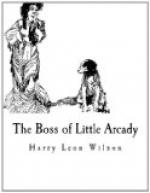When Clem, with an air of having had word from a numerous kitchen crew, stood before us and bowed out, “Miss Cahline, dinneh is suhved!” I gave her my arm with a feeling of vast relief. Not only was Miss Caroline an abiding joy, but apprehension as to my modest complicity in her late distress had, too, evidently been groundless. She had once, with what seemed to be an almost artificial politeness, asked me about our timber supply and the state of the lumber market; queries to which I had replied with an assumption of interest equally artificial, for I was ignorant of both topics, and not even remotely concerned about either.
Seated at the table, which Clem had arrayed with a faultless artistry, I promptly demanded the removal of a tall piece of cut glass and its burden of carnations, asserting that both glass and flowers might be well enough in their way, but that I could regard them only as a blank wall of exasperating ugliness while they interrupted a view of my hostess. Whereat I was again regaled with that imcomparable blush.
Clem served a soup that had been two days in the making and was worth the time. But even ere the stain had faded from the cheeks of my hostess, cheeks of slightly crumpled roseleaf, another look flashed the smile from her eyes—a quick, firm, woman look of suffering and defiance.
She had raised her glass, and I mechanically did the same.
“Mr. Blake, let us drink standing!—we women earned the right to stand with you.”
A little puzzled, I stood up to face her, as Clem pulled back her chair. One hand on the table, the other reaching her slender stemmed glass aloft, she leaned toward me with a look of singular vehemence.
“To our murdered brothers and husbands and sons, Mr. Blake! To our lost leaders and our deathless lost cause! To Jefferson Davis and Robert Edmund Lee! To the Confederate States of America!”
A black wind seemed to blow across the face of her servitor’s fluttering eyelids. But I drank loyally to Mrs. Caroline Lansdale and whatsoever that woman would. I could see that Clem exhaled a deep breath. How long he had held it I know not.
We resumed our seats, and the dinner went forward with my hostess again herself. It was a dinner not heavy but choice, a repast upon which Clem had magically worked all his spells. There was a bass that had nosed the river’s current that morning, two pullets cut off in the very dawn of adolescence, and a mysteriously perfect pastry whose secret I had never been able to wring from him beyond the uninforming and obvious enough data that it contained “some sugah an’ a little spicin’s.”
Having for my luncheon that day suffered an up-to-date dinner at Budds’s, I felt a genuine craving for food; yet the spell of my hostess was such that I left her table ahungered.




